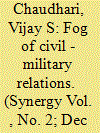| Srl | Item |
| 1 |
ID:
119850


|
|
|
| 2 |
ID:
121952


|
|
|
|
|
| Publication |
2013.
|
| Summary/Abstract |
British colonial intervention in India had sought to establish an exclusive sovereignty as was embodied in the modern state of the West. India had a tradition of existence of multiple sovereignties even during the times of strong imperial powers. Pre-colonial imperial powers had enjoyed symbolic sovereignty particularly over forest and hill areas, while local powers had undisputed sovereignty over resources and people in their territories. The British colonial state disturbed this shared sovereignty by assimilating the local sovereign powers into the state through a programme of colonial modernity, treaties, agreements and by force. This process produced contested histories. However, local powers such as the Gond Rajas were, to some extent, reduced to a subordinate position.
|
|
|
|
|
|
|
|
|
|
|
|
|
|
|
|
| 3 |
ID:
114807


|
|
|
|
|
| Publication |
2012.
|
| Summary/Abstract |
Many of the violent conflicts of the post-Cold War period have involved peoples who have historically been victims of interstate politics. Compromise is highly problematic in contexts of this kind, given that sovereign powers tend to attach the label 'terrorism' to acts of resistance and the resistance tends to claim an experience of injustice. Given a situation where compromise is seen by actors on both sides to be impossible, how would anything other than a 'rotten compromise' be possible? The article develops a framework called the Warden's Dilemma which is then put to use in the empirical exploration of two historical cases: the hunger strikes in Northern Ireland in 1980-81 and the martyrdom of Polish Solidarity's priest, Jerzy Popieluszko, a few years later.
|
|
|
|
|
|
|
|
|
|
|
|
|
|
|
|